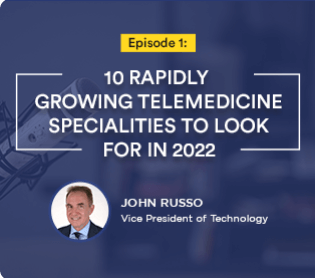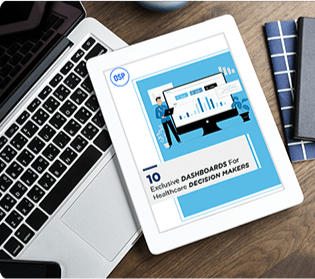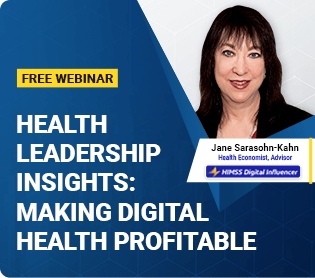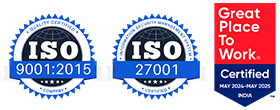An Introduction to Software Development for Healthcare:
The healthcare sector has witnessed technological breakthroughs like never before. Healthcare custom software development has turned into the need of the hour, with healthcare organizations and patients looking to lap up its many benefits. Healthcare software developers are applying Artificial Intelligence (AI) innovatively to transform and automate the process of caregiving. Healthcare software development companies are looking to consistently grow and develop software with the potential to elevate patient and provider satisfaction.
With the recognition of specific and customized needs, custom healthcare software development solutions have grabbed the attention of healthcare software development companies. From ideation to final development – the entire process of building healthcare software solutions is undertaken in a tailor-made fashion. Further, while making healthcare software product development solutions, close attention has to be paid to the migration process.
At OSP, we were approached by a healthcare client to develop a telehealth application for healthcare product development. Patients and providers could engage in online consults, appointment scheduling, and video teleconferencing. They looked for custom healthcare software development to ensure timely health access, online practice management solutions, and secure digital payments.
To address their challenges, our custom healthcare software development offered the following features:
- Simple Patient Registration – Easy-to-use patient registration module creates Electronic Health Records (EHR) by securely storing relevant patient health data.
- Video/ Text Appointments – Hassle-free interface for patients to register text consultation or videoconferencing appointments with doctors using the mobile app.
- Chatting with Experts – Connect with experienced providers through a secure mobile chat solution for better insights.
- Teleconferencing – Connect with expert health providers from the comfort of your home through mobile app streaming.
- Secure Online Payments – Patients can easily make online payments, reducing the effort of manual invoicing.
Our custom medical software development seamlessly incorporated automated healthcare provider solutions, HIPAA compliance, integrated healthcare, and integrated care management for overall satisfaction and a higher profit margin.
Healthcare Software Solutions Best Practices
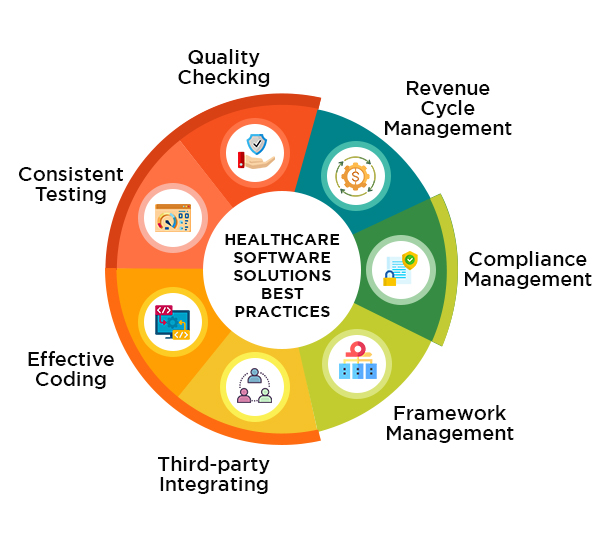
1.Revenue Cycle Management:
A critical factor in healthcare software development services is to grasp a holistic comprehension of the revenue cycle workflow of the relevant healthcare organization. Software development in healthcare has to factor in billing formats, claim details, payment modules, denial workflows, pre-registration processes, regulatory requirements, remittance, third-party involvement, and other coding and collection processes involved. The software company, healthcare industry, and healthcare custom software development are all essential entities of the process.
2.Compliance Management:
Healthcare software development services must be executed to ensure that healthcare software solutions meet all compliance and healthcare standards. A custom healthcare software development company must be aware of all healthcare integration standards – HL7, FHIR, ANSI X12n 5010, NCPDP SCRIPT, DICOM, and HL7 v3 CDA. Health software development must be undertaken by complying with the relevant standards.
3. Framework Management:
Health software development must comply with integration frameworks for electronic data exchange and medical records management. A custom healthcare software development company can provide immense benefit by adhering to the integration continuum through every stage of development.
4. Third-party Integrating:
Successful healthcare software product development involves an understanding that a single EHR software development or EMR software development may not be enough and integration with third-party liaisons may add significant value. For example, a hospital management software development may need third-party integrations with payers and vendors to create seamless healthcare interoperability.
5.Effective Coding:
EHR software development success is dependent on effective coding. Healthcare software product development is best executed with stage-wise coding, wherein coding is done on smaller levels and tested for efficiency. This will ensure that there are no large coding errors through healthcare analytics solutions. Consider effective coding as the lifeblood of healthcare solution development services.
6.Consistent Testing:
Regular testing is a wise idea for software development in the healthcare industry. Custom healthcare software development services must undertake consistent testing and regular intervals to ensure smooth functionality. Unit testing, integration testing, functionality testing, system testing, and performance testing are important factors.
7.Quality Checking:
Medical software development services should have a clearly outlined framework and stringent quality check measures. EMR software development and patient engagement systems can greatly benefit through quality analysis and testing.
8.Disaster Recovery
In healthcare software product development, having backup and disaster recovery capabilities is important to tackle data loss and system failures. The backup abilities integrated into the healthcare software solutions will help providers recover crucial clinical data worth hundreds of dollars
9.Authentication and Authorization
Healthcare software development is incomplete without secure authentication and authorization. It ensures that the right users have easy access to the required data. Besides, performance monitoring practices must also be included to ensure that the software functions optimally and data is stored and managed effectively.
10. Data Access Controls
Including data access controls in software development in healthcare is quite essential. It’s primarily to ensure data security. Moreover, auditing and logging-in capabilities are required to keep a tab on user access and activities. As healthcare software product development will deal with a large amount of data, incorporating data access controls as a practice will benefit providers only.
5 Common Mistakes in Healthcare Industry Software Development
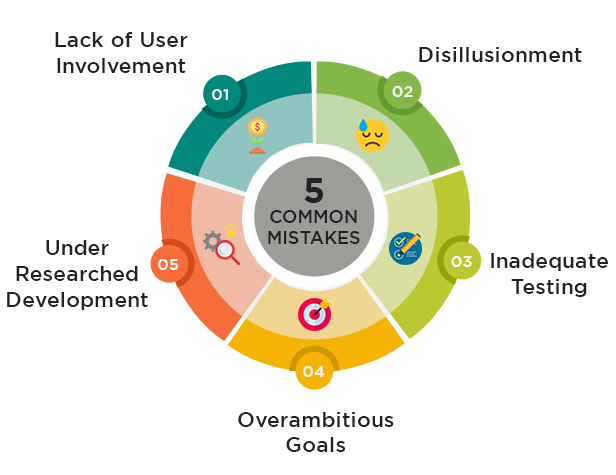
1. Lack of User Involvement:
Hospital software development should be done while keeping the user at the forefront throughout the development process. If the hospital software development company fails to educate and train users, the healthcare software product development will not be accepted and used entirely. Automated healthcare solutions, for example, can bring in a great advantage toward easing the hassle of healthcare processes. However, if users are resistant toward utilization due to a lack of familiarity and training, they will continue to use manual processes. Consistent user feedback during the development stages will also play a big part in a successful launch.
2. Disillusionment:
Software development, medical or otherwise, should always be initiated with the end-goal in clear sight. The final stage of achievement should always be an achievable target and not something that will be thought about later. Within mobile healthcare software development, for example, if the idea is to launch in multiple cities, the requirements of all cities should be taken into consideration throughout the development. The custom hospital software development company should be wary of an adaptation approach involving high unaccounted costs and other difficulties. Using broad clinical informatics can aid developers in gaining a holistic picture.
3.Inadequate Testing:
When healthcare solution development services are undertaken without adequate testing, glitches and process inefficiencies are highly likely to occur. A fully developed product that experiences inefficiencies in process flows can cost the healthcare organization a hefty sum to rectify. It is also possible that the software will even cease to be used due to this. Coding errors are common and should be nipped in the bud with regular testing. Medical mismanagement can have drastic implications on patient health, and testing, therefore, must be prudently executed.
4. Overambitious Goals:
Sometimes, a custom hospital software development company may receive a quite big project in its objective. Population health management solutions, undertaken through cloud computing in healthcare, can be one such example. Even though these are achievable, it is important to understand the scope of the software and align goals accordingly. Biting off more than the technology can chew will eventually lead to failure. Healthcare solution development services should be done with a clear view of attainability and available resources. Technical support is another important factor of consideration. The easiest tip toward avoiding this blunder is to build from the bottom-up, with the patient and providers as the driving force.
5.Under Researched Development:
Finally, healthcare software product development is safest when backed by holistic and rigorous research. For example, the developer should know the project’s scope, the number of users using it, the speed at which the software will need to function, etc. All of these areas and more should be researched before development. Determining the demand for the software and undertaking load testing is critical to launching success.
Healthcare Software Development Trends To Look Upto In the Future
Today’s healthcare industry seems crippled without any software or technology. EHRs, EMRs, practice management solutions, billing solutions, and more are running the industry, enabling healthcare providers to focus on care delivery rather than administrative chores. As per recent reports, the healthcare software product development industry is expected to reach USD 79.56 billion by 2030. That means the usage of software applications will surge in demand. With technology advancing at warp speed, IT development teams and healthcare organizations must be on their toes to keep track of future trends. To make it easier for you, here are a few trends expected to boost healthcare software development in the coming years.
1. Internet of Medical Things
Medical applications and devices are growing rapidly as healthcare consumers are more inclined towards remote care. Healthcare at home, wearables, and remote care delivery are some of the common demands of patients today. These are connected to ensure effective care delivery and data sharing. And this is what the Internet of Medical Things is all about. It’s expected to reach $14245B by 2026, considering the increasing demand. While telehealth and RPM solutions have established a niche in the healthcare industry, it is still growing, and one can expect more advancements in this connected ecosystem. Besides, providers will also benefit from it, enabling them to reach rural areas effectively and people who cannot leave their homes but need regular care. Indeed, IoMT is an effective solution for chronic care management, real-time patient monitoring, enhanced drug management, and even patient management. In other words, this technology is worth considering if you’re in custom healthcare software development.
2. Advanced Cloud Computing
Today’s healthcare industry is all about flexibility and convenience. Not just patients but physicians and staff also look for work flexibility. Remote working for staff and physicians is quite trending, especially after the Covid-19 pandemic. And for caregivers, this is possible only through cloud technology. Cloud computing technology makes it easier for caregivers to access clinical data from anywhere, anytime, and deliver care. It also ensures improved patient data protection and redefines healthcare delivery services. That means alongside securely storing the patient data, cloud technologies also empower providers to offer digitally advanced care to boost patient experiences.
3. Blockchain
Another rapidly growing trend in health software development is blockchain technology. It’s a one-stop solution to data-related issues. Blockchain is like a decentralized digital ledger that records transactions in chronological order. Moreover, it can store every data type, making it suitable for medical records storage. Providers can go stress-free about data security, as this technology ensures the privacy of crucial, sensitive patient data that can’t be altered. So, implementing this technology while building health software will benefit providers.
4. Chatbots
Chatbots in healthcare software applications offer a wide spectrum of benefits. Healthcare staff typically handles many administrative tasks, and replacing most tasks with automated systems is better. And chatbots are one of those systems powered by new emerging technology. From appointment scheduling and primary health checkup to customer services and patient feedback, these chatbots are highly effective in handling these tasks. Providers might have apps to schedule appointments, but chatbots can help manage and schedule an appointment through the website. Moreover, this chatbot technology is also a huge money saver for providers.
5. Big Data
Data plays a huge role in the current healthcare ecosystem. Every day healthcare organizations handle large amounts of data, which is crucial for patient care, research and development, SoDHs, clinical decision-making, and more. However, it’s also essential to manage such huge amounts of data effectively. Big Data is the right technology to manage this huge amount of data in a breeze. Besides, it also helps deliver effective care, optimize hospital performance, prevent epidemics or sudden disease outbreaks, reduce costs, and so on. With more and more dependency on data, providers will benefit from technology like Big Data.
6. AI/ML/NLP
Artificial Intelligence is the future of healthcare software product development. And in AI, Natural Language Processing will be the most credible technology in the next few years. AI/NLP will benefit healthcare providers in myriad ways, including clinical documentation, automated registry reporting, speech recognition, and so on. Healthcare software solutions integrated with AI can enhance care delivery, reduce errors, boost operational efficacy and diagnostic accuracy, and even minimize expenses. The future of healthcare software solutions seems bright with AI implementation.
Custom Software vs. Off-the-Shelf Software Development
Healthcare software product development is a complicated process. However, healthcare software solutions are available in two categories- customized and off-the-shelf software. While off-the-shelf software development is more like ready-made software, custom software solutions are developed as per the growing needs of healthcare providers. By comparing the healthcare software development process, providers can understand the best for them. Take a look at how both are different.
- Off-the-shelf software development is more focused on the needs of the mass audience, but customized software looks into the specific needs of users.
- Unlike customized software solutions, off-the-shelf solutions lack flexibility, and their developmental costs can be predicted.
- As customized software development is more personalized, it includes only essential features, but off-the-shelf includes more, even unnecessary ones.
- Opting for custom software development means organizations hold ownership rights. And can demand maintenance and schedule upgrades whenever required, unlike off-the-shelf software development.
Well, these aspects make it clear how custom healthcare software solutions are much better if you want to cater to the specific needs of your patients and business. Here are a few benefits of opting for custom healthcare software development solutions.
1. Unique Solution: The primary aim of a custom healthcare software development company is to offer a unique solution to the user’s business needs. These customized software solutions are developed only after understanding the requirements of the business well. Developers ensure that users get unique and personalized solutions that will cater to their consumers aptly and help generate better revenue and feedback.
2. Customer satisfaction: A recent report stated that nearly 71% of consumers expected personalized solutions, with 76% being upset about not getting them. Custom healthcare software development ensures personalized solutions that directly boost customer experience and the organization.
3. Security: Data threats and hacks are more common today and can cost healthcare companies millions of dollars. But custom health solutions can save from such loss, as it ensures better security. Being a closed-source project, the risks of such threats are also low.
4. Flexible and scalable: One of the biggest advantages of custom health software development is flexibility and the ability to scale the software. As per the needs, healthcare companies can upgrade or make changes in the software. And even strategize its scalability in the initial project scope.
5. Integrations: Integrating other applications is a superpower of custom health solutions. Integrating the custom software with the existing software makes it easier for providers to use them and even saves costs.
6. Reliable: Custom healthcare software solutions are undoubtedly reliable, as it’s more secure and open to modifications. Healthcare providers own the rights and can make changes whenever required to ensure better performance and efficacy.
Conclusion:
Healthcare software development can be a tricky game, but here are some helpful tips towards overall success. Ensure that user opinions are always taken into consideration, and strict quality controls are put in place. Engage in regular software testing to avoid malfunctions and be sure that the architecture and applications are a seamless match. Finally, peer review processes can be beneficial to maintain accountability and adherence to deadlines.
OSP is a trusted software development company that delivers bespoke solutions as per your business needs. Connect with us to hire the best talents in the industry to build enterprise-grade software.
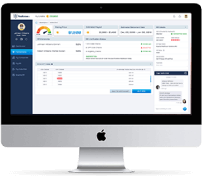
How can we help?
Fill out the short form below or call us at (888) 846-5382
Looking for software solutions to build your product?
Let's discuss your software solutions for your product in our free development acceleration call!
Get In Touch arrow_forwardDiscuss Your Project Handover with a team of expert Book a free consultation arrow_forward
About Author

Written by Riken Shah linkedin
Riken's work motto is to help healthcare providers use technological advancements to make healthcare easily accessible to all stakeholders, from providers to patients. Under his leadership and guidance, OSP Labs has successfully developed over 600 customized software solutions for 200+ healthcare clients across continents.












